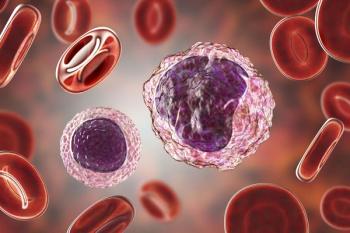
Julie M. Vose, MD, MBA, looks back at the 2024 ASCO Annual Meeting and highlights key presentations.

Your AI-Trained Oncology Knowledge Connection!


Julie M. Vose, MD, MBA, looks back at the 2024 ASCO Annual Meeting and highlights key presentations.

The approval for epcoritamab in patients with R/R follicular lymphoma was supported by encouraging efficacy findings from the phase 1/2 EPCORE NHL-1 trial.

A statistically significant and clinically meaningful improvement in progression-free survival in the phase 3 trial DUO-E support the recommendation.

Study results suggest follow-up with hypercholesterolemia control and audiological assessments for cisplatin-treated patients with cancer.

Developers intend to halt the phase 2/3 SKYSCRAPER-06 trial assessing tiragolumab plus atezolizumab and chemotherapy in nonsquamous NSCLC.

Bispecific antibodies including epcoritamab have “a lot of potential for upward mobility” in lymphoma, according to Tycel Phillips, MD.

A phase 1/2 trial assessed the use of menin inhibitor DSP-5336 in patients with acute leukemia overexpressing HOXA9 and MEIS1.


A phase 1 trial assessed the use of PSCA-directed CAR T cells in patients with metastatic castration-resistant prostate cancer.

A pooled analysis trial assessed the impact of acalabrutinib in patients with chronic lymphocytic leukemia across treatment lines.

Data also show statistically meaningful improvements in endocrine symptoms and breast cancer–specific quality of life with acupuncture.

Findings from a phase 1 study may inform future trial designs intended to yield longer responses with PSCA-targeted CAR T cells.

A phase 1 trial assessed the use of PSCA-directed CAR T cells in patients with metastatic castration-resistant prostate cancer.

Investigators will assess the clinical activity, safety, and pharmacokinetics of GTB-3650 among those with CD33-expressing cancers in a phase 1 trial.

Second interim analysis findings from CARDITUDE-4 show no new safety signals with cilta-cel in relapsed, lenalidomide-refractory multiple myeloma.

Kamran Idrees, MD, MSCI, MMHC, FACS, discusses how factors such as vessel involvement can influence the decision to proceed with surgical therapy.

All patient populations benefitted from glofitamab in a phase 1/2 trial, but the design excluded capture of high-risk features present in similar studies.

The announcement follows results from the ENVASARC trial, where the primary endpoint needed to support a biologics license application was not met.

Phase 1 data support the application for cosibelimab as a treatment for those with metastatic or locally advanced cutaneous squamous cell carcinoma.

Tissue biopsy was recommended among Black patients at risk of endometrial cancer over the common ultrasonography triage strategy.

Milad Baradaran, PhD, DABR, outlines the design of Mobetron as an option for administering intraoperative radiation therapy in pancreatic cancer care.

In addition to tissue biopsy, a liquid biopsy test can be used to better identify patients who may benefit from niraparib and abiraterone acetate.

Researchers at the Mayo Clinic have found that mesenchymal stromal cells engineered with chimeric antigen receptors can enhance immunosuppression in the context of immune-related disorders.

In a collaborative effort between 18 centers, researchers have developed a system that effectively stratifies children at the onset of acute graft versus host disease for risk of non-relapse mortality over 6 months.

The EA2201 trial assessed nivolumab plus ipilimumab and short-course radiation therapy for patients with locally advanced rectal cancer.

Findings from ELM-1 and ELM-2 support the positive opinion for odronextamab as a treatment for relapsed/refractory follicular lymphoma and DLBCL.

AI tools may show utility in areas such as prostate diagnostic imaging, pathology, and treatment outcome predictions.

The new recommendation update modifies a 2020 ASCO guideline on the selection of optimal adjuvant chemotherapy and targeted therapy for breast cancer.


Phase 1 data may warrant further investigation of lunresertib in high-risk gastrointestinal tumors with CCNE1 amplifications or FBXW7 mutations.